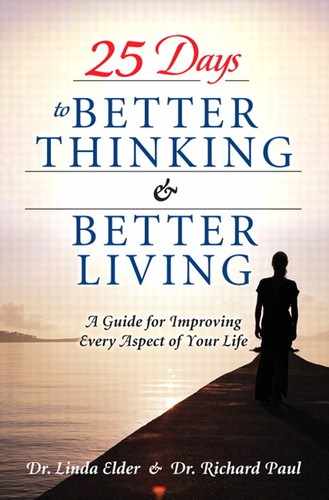Uncover Your Ignorance
Notice Contradictions
Be Fair, Not Selfish
Stick to Your Purpose
Be Clear
Be Relevant
Question, Question, Question
Think Through Implications
Control Your Emotions
Control Your Desires
Be Reasonable
Show Mercy
Think for Yourself
Don’t Be a Top Dog
Don’t Be an Underdog
Don’t Be a Worry Wart
Stop Blaming Your Parents
Critique the News Media
See Through Politicians
Be a Citizen of the World
Notice Media Garbage
Make Your Mark
Educate Yourself
Figure Out Where to Go
</feature>Be on the lookout for reasonable and unreasonable behaviors—yours and others’. Notice when you are unwilling to listen to the reasoned views of others, when you are unwilling to modify your views even when others present evidence or good reasoning supporting a better view. Carefully observe yourself. Can you be moved by reason? Are you open to the voice of reason in others? When you catch yourself being defensive, see if you can break through your defensiveness to hear good reasons being presented. Identify times when you use language that makes you appear reasonable, even though your behavior proves otherwise. Try to figure out why you, or others, are being unreasonable. Might you have a selfish interest in not being open-minded? Might they?
One of the hallmarks of a critical thinker is the disposition to change one’s mind when given a good reason to change. Good thinkers want to change their thinking when they discover better thinking. In other words, they can be moved by reason.
Yet, comparatively few people are reasonable in the full sense of the word. Few are willing to change their minds once set. Few are willing to suspend their beliefs to hear the views of those with whom they disagree. This is true because the human mind is not naturally reasonable. Reasonability, if it is to develop in the mind to any significant degree, must be actively fostered in the mind by the mind. Although we routinely make inferences or come to conclusions, we don’t necessarily do so reasonably. Yet we typically see our conclusions as reasonable. We then want to stick to our conclusions without regard for their justification or plausibility. In short, the mind typically decides whether to accept or reject a viewpoint or argument based on whether it already believes it.
To put it another way, the mind is not naturally malleable. Rather, the mind is, by nature, rigid. It often shuts out good reasons readily available to it. It often refuses to hear arguments that are perfectly reasonable (when those reasons contradict what it already believes).
To become more reasonable, you need to open your mind to the possibility, at any given moment, that you might be wrong and another person may be right. You need to be willing and able to change your mind when the situation or evidence requires it. You need to recognize that you don’t lose anything by admitting that you are wrong. Rather, you gain.
Notice how seldom people admit they are wrong. Notice, instead, how often they hide their mistakes. Most people would rather lie than admit to being wrong. Decide that you do not want to be such a person.
Say aloud: “I’m not perfect. I make mistakes. I’m often wrong.” See if you have the courage to admit this during a disagreement: “Of course, I may be wrong. You may be right.”
Practice saying in your own mind, “I may be wrong. I often am. I’m willing to change my mind when given good reasons.” Then look for opportunities to make changes in your thinking.
Ask yourself, “When was the last time I changed my mind because someone gave me better reasons for his or her views than I had for mine?” To what extent are you open to new ways of looking at things? To what extent can you objectively judge information that refutes what you already think?
Realize that you are being unreasonable if
you are unwilling to listen to someone’s reasons.
you are irritated by reasons people give you (before thinking them through).
you become defensive during a discussion.
When you catch yourself being close-minded, analyze your thinking by completing the following statements in your journal (remember that the more details you write in your journal entries, the better able you will be to change your thinking in future similar situations):
I realize I was being close-minded in this situation because...
The thinking I was trying to hold onto is...
Thinking that is potentially better is...
This thinking is better because...
